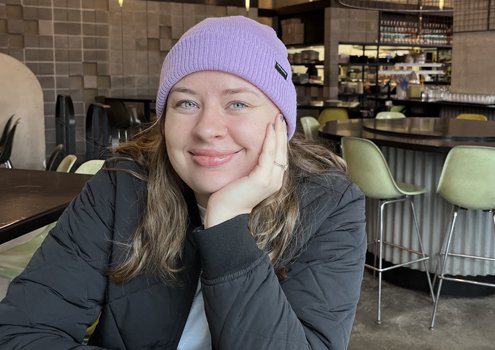Reading time: About 2 minutes
Chelsey Dyck says she was surprised to discover how slow the writing process could be. But speaking with other writers has helped her to create a new timeline. And deadlines help….
Chelsey Dyck is a Mennonite writer living in East Vancouver with her cats. She graduated from The Writer’s Studio in 2024, and she is presently working on a memoir about her relationship with her body as something that belonged to God and to her husband before it finally belonged to her.
I was excited to talk to Chelsey about how she approaches writing.
Q. Roughly how much time do you spend writing every day?
When I’m inspired, I’ll easily write for five hours in a day. But some days I only write a few hundred words in the notes app on my phone that never make it into a draft. As a habit, I try to write something every day, but I don’t give myself a minimum time. The hardest part (for me) is starting, and then I can usually carry on until I’ve finished a section or a chapter.
Q. What’s a simple activity or habit that makes you a better writer?
It’s probably an obvious answer, but reading! A really good book will have me putting it down every chapter because I’m so inspired that I have to write. Good writing will always inspire me, whether it’s a thought the book provoked or a phrase the writer used that made me think of a new way to describe something in my own manuscript. A strong voice will also make me want to try imitating it in my own way.
Q. What interferes with your writing?
I’m the biggest interference in my writing. Whether it’s that I lack motivation or that I get too into my head with insecurity, the biggest battle I face to put words on the page is against myself.
Q. How do you persuade yourself to sit down to write on days when you really, really DON’T feel like doing it?
I’ve found having deadlines works for me. It’s best if the deadline is tied to something external and unmoveable. Right now, I’m set to attend the Surrey International Writing Conference at the end of October, so I’m using that as a deadline to have the next draft of my manuscript finished.
Q. Is there a particular motto or saying that you’ve found helpful for writing?
Virgina Woolf said, “If you do not tell the truth about yourself, you cannot tell it about other people.” The piece I’m presently working on is a memoir, and one of my biggest worries is that I’m painting people I love in a bad light when I tell the truth about certain memories. But I try to be as fair to everyone else as I am to myself in my writing. I have the benefit of getting to shape the narrative, so I try to take a step back to look at myself objectively and at everyone else with grace.
Q. Which stage of the writing process do you enjoy the most: researching, writing or editing/rewriting and why?
So far, I have found writing the first draft to be the most exciting. Everything feels possible, and at one point, I found a rhythm that allowed the story to pour out of me quite quickly. Revisions have been much slower and more challenging. There’s freedom in being able to write a garbage first draft and thinking “I’ll fix that later,” so I get stuck in revisions when I can’t figure out how to fix something and I don’t want to move on from it the same way I did in the writing stage.
Q. What’s the best book you’ve read (either fiction or non) in the last five years?
This is an impossible question. But the first book that came to mind was Bunny by Mona Awad. It’s the first really strange literary fiction book that I read, opening my eyes to what could be done within the genre. The horror aspects were both shocking and exciting, and the structure was like nothing else I’ve read, making it unpredictable and unputdownable. Since reading Bunny, I mostly only read literary fiction because I love the genre so much.
Q, What book are you reading right now?
I’m reading The Idiot by Fyodor Dostoyevsky. Elif Batuman’s novel by the same name is another contender for “favourite book” for me, so I wanted to read the Russian classic that partially inspired the title. I’m loving it. I think Nastasya Filippovna could have been the original “weird girl fic” heroine if the book were told from her point of view.
Q. What do you think is the biggest misperception that new writers have about the act of writing?
I can only speak for myself, but when I started writing, I had no idea how slow the process is. The act of writing a book can take years, and that’s only the first step. I think there can be some fear that if it doesn’t happen right away, it’ll never happen, but that’s not true for basically anyone. There’s so much rejection and behind-the-scenes work taking place for every writer (at least the ones I’ve spoken to). Talking to other writers and seeing their processes has helped me to accept my timeline.


